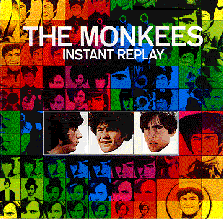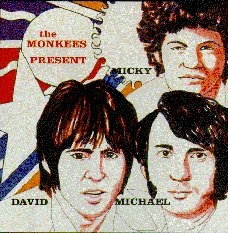GLEEB> the post-peter years
The Post-Peter Years
1969 started on a somber note for the Monkees, who were now trying to find their own identity following the departure of Bert Schneider and Bob Rafelson from the project they created. The band had total control of everything, which resulted in basic disaster.
 INSTANT REPLAY
INSTANT REPLAY1969
The first Monkee album without Peter. Mainly featured songs recorded in 1966 for inclusion on the TV show, but left in the can. The album had a lot more country than usual, thanks to Mike, on a power trip since Peter's departure. Davy kept mainly with Boyce/Hart songs, and Micky contributed several of his own, including the infamous "Shorty Blackwell," an ode to the Dolenz family cat. Needless to say, this ain't groundbreaking stuff we're talking about here.
SINGLES: "Tear Drop City" b/w "A Man Without A Dream." Reached #56. "Tear Drop City" was essentially a throwback to the band's first hit single, "Last Train To Clarksville," with its nearly identical melody.
Instant Replay had absolutely nothing going for it, but the guys still promoted it tirelessly, with appearances on The Johnny Cash Show, The Glen Campbell Goodtime Hour, and others. Soon after the album was released, the boys arranged to do a tour with Sam & The Goodtimers, former backing band of the famed Ike & Tina Turner Revue. It would commence after the next album release from The Monkees, the final to include Michael.
 THE MONKEES PRESENT
THE MONKEES PRESENT1969
The final Monkees album to include Michael. It was orignally planned as a 3-disc set to feature the works of each of the boys solo. Colgems turned down this request, since the Monkees were definitley not selling as well as they used to. Production costs were cut down greatly for Present, but the band still had two Colgems reps on their side -- music coordinator and now Colgems head Lester Sill, and jazz arranger Shorty Rogers, who helped to arrange many of Micky's recordings on the record.
SINGLES: "Listen to the Band" b/w "A Man Without A Dream," which was critically praised but didn't do well on the charts. "Good Clean Fun" b/w "Someday Man" was the follow-up, but it sank without a trace.
Following the sessions for Present, Nez began to drift out of the group. He toured with them during their surreal '69 tour, but then abandoned ship once 1970 came around, announcing the formation of his First National Band. They released their first album in the spring of 1970 under the support of Davy and Micky, the only two guys left. When Michael and his band did their first live performance in March of 1970, Micky, Davy, Peter, and most of the crew from the TV show were in attendance.
The Monkees, for all intents and purposes, were finished. Still, they had a contract to Colgems to make a few more albums. To round out the two they still had due, Colgems sent them to New York City for recording with Jeff Barry, the "I'm A Believer" producer. Troubles escalated between Davy and Colgems execs when they refused to pay for him to bring along year-old daughter Talia to NYC. He defiantly took the trip and recorded his share, then split.
 CHANGES
CHANGES1970
Last Monkees album until 1987. Micky and Davy only went on because of their contractual obligations. The album was such a disaster to Davy that he orignally refused to talk about for liners for its Rhino reissue. Micky did the lion's share of the vocals. Everyone basically let it sink without a trace. The few copies it sold was due to Saturday morning reruns of the show on CBS. Otherwise, it went nowhere. Copies of the orignal Changes LP are valued at $100 today.
SINGLES: "Oh My My" b/w "I Love You Better," which didn't chart. "Do It In The Name Of Love" b/w "Lady Jane," released in 1972 as scraps from the Changes sessions, didn't chart, either.
Just like with the TV show, everyone thought the Monkees were long gone and forgotten. BUt, as Davy once said, "The Monkees are like the mafia. Sooner or later, we all come back"...